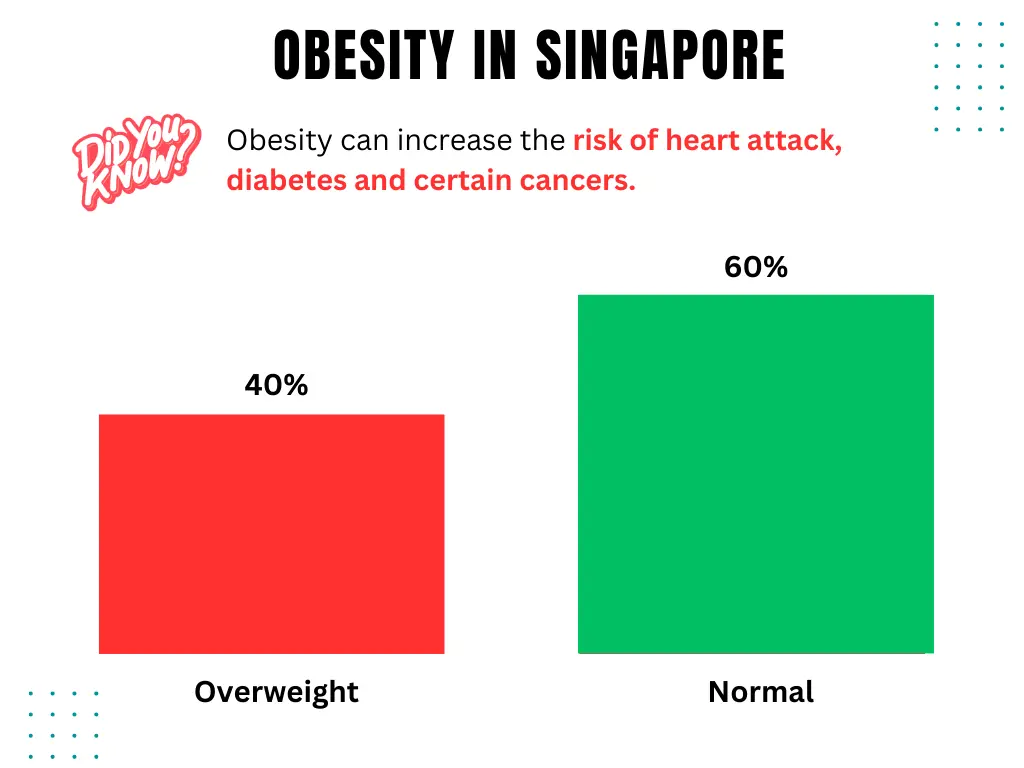Weight Loss Singapore
Starting your weight loss journey can feel overwhelming, especially if you have faced setbacks in the
past. At healthscreening.sg, we recognise these challenges and provide medically supervised
treatments to support your efforts every step of the way.
While medications can play a role, long-term success depends on making sustainable changes to your
lifestyle. When combined, these approaches not only improve appearance but also lower the risk
of health conditions such as diabetes, heart disease, and joint problems.
Our holistic approach focuses on personalised care, with guidance designed to help you
achieve healthier weight management and long-term well-being.
Obesity in Singapore
In Singapore, obesity is a major health concern, with nearly 40% of adults classified as
overweight or obese. This trend has been rising over the past decade, driven by
increasingly sedentary lifestyles, changes in dietary habits, and greater exposure to
high-calorie foods.
The impact is felt not only at an individual level but also as a public health challenge, with
obesity contributing significantly to healthcare costs and placing added strain on the
healthcare system.

Effects of Obesity on Health
Obesity has wide-ranging effects on both physical and mental health. Its impact goes beyond appearance and can contribute to several serious conditions.
- Metabolic health – Strongly linked to type 2 diabetes and insulin resistance, which are highly prevalent in Singapore.
- Heart and circulation – Increases the risk of high blood pressure, high cholesterol, and cardiovascular disease, which remain major causes of illness and death.
- Joints and mobility – Extra strain on knees, hips, and the lower back often leads to osteoarthritis and chronic pain, especially in middle-aged and older adults.
- Sleep and breathing – Commonly associated with sleep apnoea and disrupted breathing at night.
- Psycho-emotional health – Can contribute to low self-esteem, social stigma, anxiety, and depression, affecting daily life and relationships.
- Cancer risk – Raises the likelihood of certain cancers, including breast, colon, and liver cancer, though these may develop over the longer term.
What Causes Obesity / Weight Gain?
Obesity and weight gain usually result from multiple overlapping factors rather than a single
cause. At the core, weight increases when more calories are consumed than the body uses for
energy. Over time, this excess energy is stored as fat.
Common contributors include:
- Dietary habits – Regular intake of high-calorie, processed, or sugary foods is one of the most frequent causes of weight gain.
- Physical inactivity – Sedentary lifestyles, desk-based work, and prolonged screen time reduce daily calorie expenditure and are very common in modern living.
- Age-related changes – Metabolism slows with age, and muscle mass declines, making weight gain easier over time.
- Genetic predisposition – Inherited traits such as a naturally slower metabolism, greater tendency to store fat, or appetite regulation differences can increase the likelihood of obesity.
- Hormonal changes – Disorders such as hypothyroidism reduce metabolism, while conditions like polycystic ovary syndrome (PCOS) disrupt hormonal balance, both of which can make it harder to lose weight.
- Medical conditions and medications – Some chronic illnesses or medications, including antidepressants and steroids, can promote weight gain as a side effect.

When Should You Seek Medical Help for Weight Loss?
You should seek medical help for weight loss when excess weight is linked to health risks or when self-directed methods have not worked. This can include:
- Obesity-related conditions – Such as diabetes, high blood pressure, or high cholesterol, where managing weight may help control or reduce complications.
- Concerning symptoms – Fatigue, breathlessness, or joint pain linked to excess weight may require medical evaluation to prevent worsening health.
- Hormonal or medical causes – Issues like hypothyroidism or PCOS can make weight loss difficult; a doctor can diagnose and treat these conditions.
- Unsuccessful lifestyle changes – If diet and exercise alone have not produced sustainable results, medications or structured programmes may help support progress.
What Are Some Medical Weight Loss Options?
Medical weight loss options often include lifestyle interventions, prescription medications, and, for selected patients, surgical procedures. These methods are usually combined as part of a holistic approach to support sustainable weight management.
| Option | Description |
|---|---|
| Lifestyle modification |
|
| Prescription medications (oral) |
|
| Weight loss injections |
|
| Bariatric surgery |
|
What to Expect from Our Weight Loss Programme in Singapore
1. Initial health assessment – Review of medical history, BMI, and body composition using tools such as InBody test or DEXA scan, with screening for underlying conditions.
2. Personalised treatment plan – Tailored combination of lifestyle guidance, medication, or injections if suitable.
3. Nutrition and activity support – Practical advice on diet and exercise to fit daily routines.
4. Progress monitoring – Regular reviews to track results and adjust the plan where needed.
5. Long-term weight management – Strategies to maintain results and reduce the risk of weight regain.
What Is the Cost of Weight Loss Treatments?
At healthscreening.sg, our prices for weight loss treatments are as follows:
| Treatment | Price* |
|---|---|
| Consultation | From $49.05 |
| Appetite Suppressants | From $200 |
| Weight Loss Injections | From $422.92 / box** |
*Prices are NETT and inclusive of GST.
**One box contains 3 vials and each vial can last 6 days at maximum dose.
Book a Weight Loss Consultation with Our Doctors
Why Choose Us?








Navigate Easy With Google Maps
Health Screening Singapore (Anson House)
Nearest MRT: EW15 Tanjong PagarHealth Screening Singapore (Camden Medical Centre)
Nearest MRT: TE13 Orchard BoulevardHealth Screening Singapore (CPF Jurong Building)
Nearest MRT: NS1/EW24 Jurong EastFrequently Asked Questions (FAQ)
Corn can be part of a weight loss diet as it is naturally high in fibre, which supports fullness, and provides vitamins and minerals. However, it is also relatively high in carbohydrates, so portion control is important if you are monitoring calorie intake. Whole corn and minimally processed forms are generally more beneficial than refined corn products. It is advisable to consult a nutritionist, dietitian, or doctor for guidance on including corn in your diet.
Constipation does not cause long-term weight gain but may lead to temporary bloating or a feeling of heaviness due to retained stool and gas. This can make the body feel or appear slightly heavier, though it is not the same as an increase in body fat. Improving hydration, fibre intake, and activity levels can usually help relieve constipation.
High LDL cholesterol itself does not directly cause weight gain, but it often reflects underlying lifestyle factors such as a diet high in saturated fats or lack of exercise, which can also contribute to weight gain. Both elevated LDL cholesterol and excess weight increase cardiovascular risk, so managing diet, activity, and body weight together is important.
The fastest way of losing weight is usually through creating a large calorie deficit with strict diets or intense exercise, but this is often not sustainable and may lead to muscle loss or nutrient deficiencies. Most guidelines recommend gradual weight loss of about 0.5 to 1 kilogram per week through a balanced plan of dietary changes, physical activity, and medical support if needed. It is advisable to consult a doctor for personalised guidance.
Ozempic (semaglutide) is registered in Singapore for the treatment of type 2 diabetes, and weight loss is a recognised secondary benefit. Other GLP-1 receptor agonists, such as liraglutide, dulaglutide, or tirzepatide, may also be prescribed for obesity management in selected patients. It is advisable to consult a doctor to determine if these treatments are appropriate for your condition and weight loss goals.
No single treatment is universally best for weight loss, as the most appropriate approach depends on your health status, goals, and medical needs. Lifestyle modification is the foundation for most individuals, while medications, injections, or surgery may be considered for those with obesity or related conditions. Combining approaches within a medically supervised programme is widely regarded as a more sustainable way to achieve and maintain weight loss.
A reasonable amount of weight can be lost over three months through gradual and consistent changes in diet, physical activity, and lifestyle habits. This pace is generally considered more sustainable and reduces the likelihood of regaining weight compared to rapid loss. Actual results vary depending on factors such as metabolism, underlying health conditions, and whether medical treatments are included.
The golden rule for weight loss is to maintain a consistent calorie deficit, meaning you consume fewer calories than your body uses. This works best when achieved through balanced nutrition, regular physical activity, and sustainable lifestyle changes rather than strict short-term diets. Adequate sleep and stress management also play important roles. If these measures are not effective, you may require medical help, where supervised programmes can include prescribed medication.
Losing a large amount of weight in just two weeks is generally unrealistic and may pose health risks such as nutrient deficiencies, muscle loss, or dehydration. Rapid weight loss methods can also increase the likelihood of regaining weight afterwards. A gradual and steady approach is usually more sustainable. If you need to lose weight more quickly for medical reasons, it is advisable to consult a doctor, nutritionist, or dietitian for supervised options.
Drinking water can support weight loss by promoting fullness, reducing unnecessary snacking, and replacing high-calorie drinks like sugary beverages. Adequate hydration also helps the body function properly during metabolism and exercise. However, water alone does not cause significant weight loss and should be combined with balanced eating and physical activity for meaningful results.
Foods that may support weight loss include those high in fibre, such as vegetables, fruits, legumes, and whole grains, which promote fullness while being lower in calories. Protein-rich foods such as lean meats, eggs, and beans can help preserve muscle and regulate appetite. While these foods support weight management, long-term results depend on overall diet quality, portion control, and lifestyle habits rather than individual foods.
Ozempic (semaglutide) may support significant weight loss by reducing appetite and improving blood sugar control, but the amount of weight lost varies widely between individuals. Some people experience substantial reductions, while others may lose less. The medication generally works best when combined with lifestyle changes such as diet and exercise. It is advisable to consult a doctor to assess whether Ozempic is suitable for your condition and treatment goals.
Ozempic may not be suitable for individuals with a history of medullary thyroid carcinoma, multiple endocrine neoplasia syndrome type 2, severe gastrointestinal disease, or hypersensitivity to its ingredients. It may also require caution in people with pancreatitis or certain kidney problems. Suitability depends on your overall health and medical history. It is advisable to consult a doctor to determine whether Ozempic is appropriate for you.
Losing 5 kilograms in a week is generally unrealistic and may be unsafe, as rapid weight loss often causes fluid loss, muscle breakdown, or nutritional deficiencies rather than lasting fat reduction. Sustainable weight loss usually occurs at a rate of 0.5 to 1 kilogram per week with diet, exercise, and behavioural changes. In situations where quicker weight loss is medically necessary, it is best to seek support from a doctor, nutritionist, or dietitian for structured and supervised options.
There is no single pill that works for everyone, as weight loss medications vary in how they reduce appetite, block fat absorption, or regulate metabolism. Options may include appetite suppressants, fat absorption blockers, or medications that influence appetite and blood sugar regulation. Suitability depends on your health profile and potential side effects. It is advisable to consult a doctor to discuss which treatment may be appropriate for your needs.
Reducing belly fat in three weeks usually requires creating a calorie deficit through dietary adjustments, increased physical activity, and limiting processed foods and sugary drinks. Core exercises may strengthen abdominal muscles, but targeted fat loss in one area may not be possible. Instead, overall weight reduction helps decrease abdominal fat. While small changes can occur within weeks, longer-term lifestyle strategies are needed for sustained results.
Three healthy steps to support weight loss are adopting a balanced diet with controlled portions, increasing daily physical activity such as walking or structured exercise, and maintaining adequate sleep and stress management. Together, these steps create a sustainable calorie deficit while improving overall health. For individuals with obesity or related conditions, medically supervised treatments may also be beneficial as part of a holistic approach guided by a doctor.
